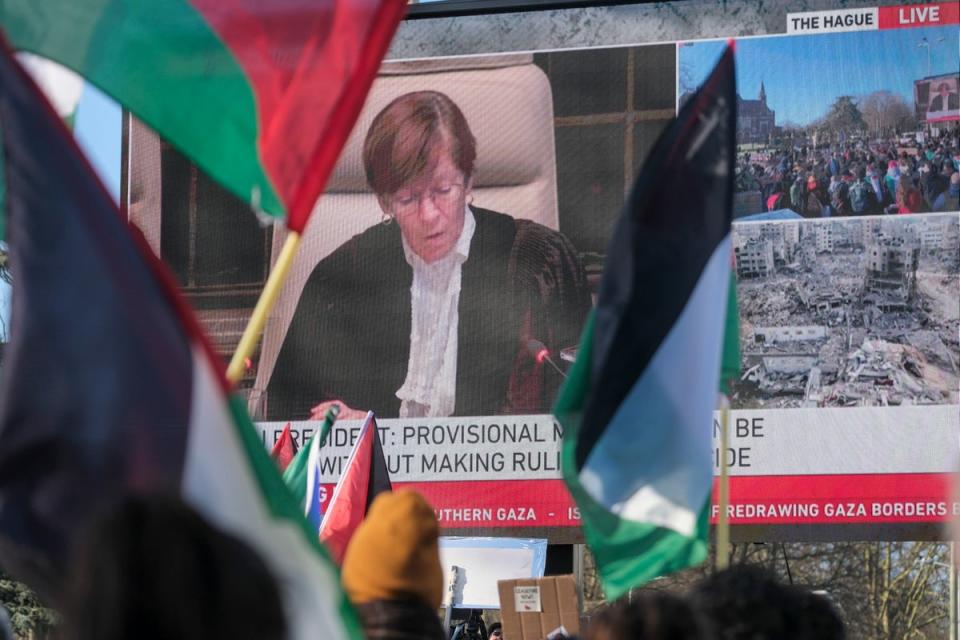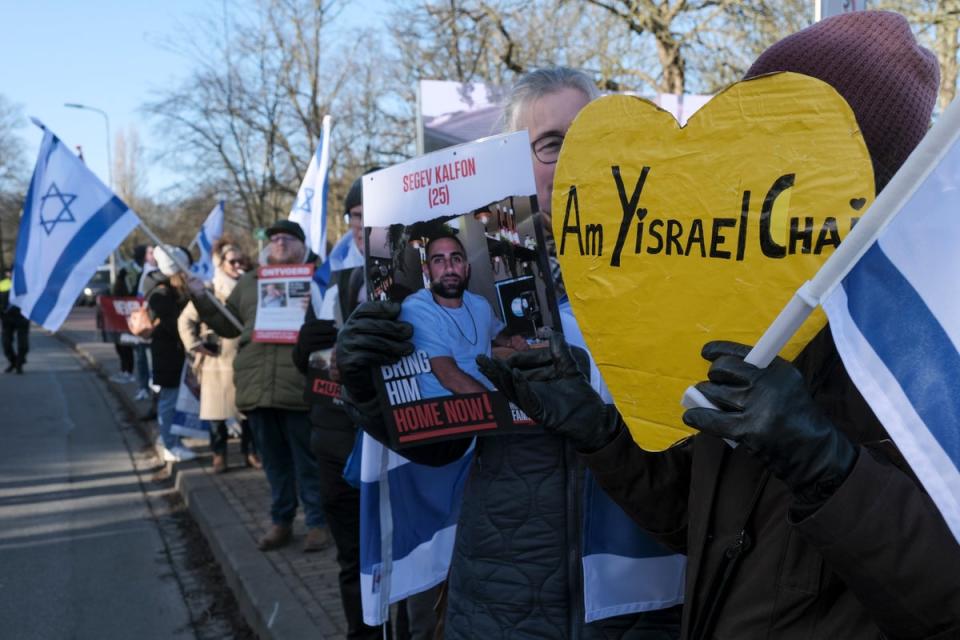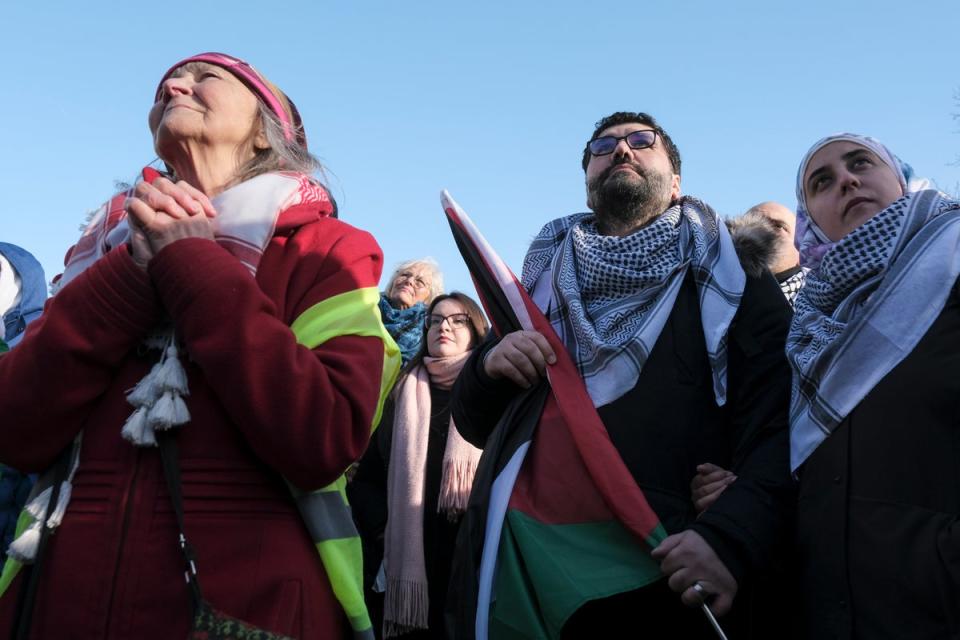UN top court orders Israel to prevent genocide in Gaza – but stops short of demanding ceasefire
UN judges today said that Israel must ensure its forces do not commit genocide against Palestinians in Gaza.
In a hearing at The Hague on Friday, the 17-strong panel of judges said it would not throw out the genocide case against Israel and that it must provide basic humanitarian aid in the Gaza Strip but stopped short of calling for a ceasefire.
South Africa had asked for the court to order Israel to halt its operation, which has laid waste to much of the enclave and killed more than 25,000 Palestinians, according to Gaza health authorities.
But the court instead urged Israel to try and contain death and damage in its military offensive, which is still ongoing and has prompted a humanitarian crisis.
The ruling comes as a blow to Israel, as it conveyed a powerful rebuke of the country’s conduct during the war and said that it must change substantially.
Israeli prime minister Benjamin Netanyahu said the genocide case is “outrageous” and Israel will continue to do “what is necessary” to defend itself.
“Like every country, Israel has an inherent right to defend itself,” he said in a statement. “The vile attempt to deny Israel this fundamental right is blatant discrimination against the Jewish state, and it was justly rejected,” he said.
Friday’s ICJ findings also put pressure on Israel’s allies, such as the US, the UK and Germany, to ensure that the country abides by the court’s measures.
In a hearing heavy with complex legal arguments, the UN top court:
Refused to throw out South Africa’s case and said that claims of genocide were “plausible”
Said that Palestinians appeared to be a protected group under the 1948 Genocide Convention
Condemned “dehumanising” language from Israeli officials
Said Israel must do all it can to prevent genocide, including refraining from killing Palestinians or causing them harm
Told the country it needed to prevent publishing comments that could be considered incitement to commit genocide
Ruled Israel urgently needs to get basic aid to people in Gaza
Joan E Donoghue, the court’s president, who read out the ruling, opened the case by noting that Israel’s war against Hamas “is causing massive civilian casualties, extensive destruction of civilian infrastructure and the displacement of the overwhelming majority of the population in Gaza.”
“The court is acutely aware of the extent of the human tragedy that is unfolding in the region and is deeply concerned about the continuing loss of life and human suffering,” the judge said.

Writing in The Independent, Tory grandee Sir Malcolm Rifkind praised the UN judges, arguing that they had reached “no view on whether there has been genocide in Gaza – nor did they call for a permanent ceasefire – but they have treated the case with the seriousness it deserves”.
Overall, the court ordered six provisional measures to protect Palestinians in Gaza and said that Israel must submit a report on its progress to meet the rulings within a month.
Following the ruling, a crowd of pro-Palestinian supporters that had gathered outside the building in The Hague waved Palestinian flags and chanted “Ceasefire now!” and “Free, Free Palestine!”
The South African government said it welcomed the provisional measures ordered by the ICJ, whereas Itamar Ben-Gvir, Israel’s security minister responded by tweeting: “Hague Shmague”.

The Palestinian foreign ministry said it welcomed the findings and said the ICJ had ruled “in favour of humanity and international law”.
In a statement, it said: “We call on all states to ensure that all provisional measures ordered by the court are implemented, including by Israel, the occupying power. This is a binding legal obligation.
“States now have clear legal obligations to stop Israel’s genocidal war on the Palestinian people in Gaza and to make sure that they are not complicit.
“The ICJ order is an important reminder that no state is above the law. It should serve as a wake-up call for Israel and actors who enabled its entrenched impunity.

“Palestine reaffirms its eternal gratitude to the people and government of South Africa for taking this bold step of active solidarity and will continue to work closely with South Africa and other countries to ensure that justice is served.”
Humanitarian organisations also welcomed the ruling on Friday, saying it was an important step in rectifying “the unparalleled catastrophic situation in Gaza”.
Balkees Jarrah, associate international justice director at Human Rights Watch, said: “The world court’s landmark decision puts Israel and its allies on notice that immediate action is needed to prevent genocide and further atrocities against Palestinians in Gaza,
“Lives hang in the balance, and governments need to urgently use their leverage to ensure that the order is enforced. The scale and gravity of civilian suffering in Gaza driven by Israeli war crimes demands nothing less.”

And Halima Begum, CEO of ActionAid UK, said: “These measures – which include taking all measures to prevent acts of genocide, such as the killing of and causing of serious bodily or mental harm to Palestinians – are potent steps toward rectifying the unparalleled catastrophic situation in Gaza where more than 26,000 people have been killed, at least two-thirds being women and children, and UN human rights experts report that all children under five – 335,000 – are at high risk of severe malnutrition as the risk of famine conditions increase by the day.
“We celebrate South Africa’s petition, and the 88 countries from the global South who supported it and see it as a bold display of moral courage borne out of its lived experience of colonisation and the horrors of apartheid.”
Friday’s decision is only an interim one and it could take years for the full case brought by South Africa to be considered.
Israel has called South Africa’s allegations false and “grossly distorted”, and said it makes the utmost efforts to avoid civilian casualties.
Israel began its offensive in Gaza after a terror attack by Hamas militants killed an estimated 1,200 people across southern Israel on 7 October.
The air and ground assault on Gaza, accompanied by a blockade on supplies entering the Strip, started in northern Gaza City before spreading to the south and is now focused on the city of Khan Younis.
More than 26,000 Palestinians have been killed in Gaza since Israel launched its operation, according to the Gaza health ministry, which does not distinguish between civilian and militant casualties.
Israel strongly denies targeting civilians but many of the victims of the more than three-months-long war have been women and children. Israel’s prime minister Benjamin Netanyahu has vowed to fight on until his country achieves a “complete victory” with the eradication of Hamas.
Israel has faced growing pressure in recent weeks from even its closest international allies, with the US president Joe Biden saying last month that Tel Aviv was losing global support due to its “indiscriminate bombing” of Gaza.


